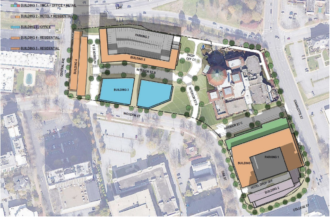On Saturday, June 8, First Baptist Church in Asheville will host a Guns to Gardens firearm surrender event, where donated weapons will be dismantled and repurposed as garden tools.


On Saturday, June 8, First Baptist Church in Asheville will host a Guns to Gardens firearm surrender event, where donated weapons will be dismantled and repurposed as garden tools.

Writer Carol Kaufman aims to disrupt negative ageist beliefs in Xpress’ new monthly series.

Whooping cough, also known as pertussis, is a bacterial infection that affects the respiratory tract. Symptoms begin with a mild cough that worsens into severe coughing fits, which can lead to vomiting in young children.

The Buncombe County Tourism Development Authority unveiled its proposed $34.3 million budget budget for fiscal year 2025 during its May 29 board meeting.

The Council chambers and overflow room were at capacity during the Tuesday night meeting where all of the speakers who commented on the proposed budget advocated for increasing pay for city employees.

The venue, which opened in 2016, has hosted dozens of live shows through the years and boasts indoor and outdoor stages, all a stone’s throw from the French Broad River.

The proposed budget includes a 4.11% salary increase for all permanent city employees.

“This company has broken our economy, tried to break our spirits, and broken promises, and that’s not how we raise our children in this state,” said Canton Mayor Zeb Smathers. “There are consequences for one’s actions.”

“It is interesting to me that anybody would think it’s OK to just walk up and grab a bear cub and not be concerned about where mama is,” says Appalachian Wildlife Refuge co-founder Savannah Trantham said. “If she had been close by, I think that you probably would have seen a different outcome.”

Mission Hospital faces an exodus of urologists, and five physicians from a local urology group refuse to practice at the HCA Healthcare-owned hospital, potentially reducing the number of specialists in the system to two by summer.

Project Aspire — a vast mixed-use, mixed-income venture slated for downtown Asheville — would have occupied 10.5 acres in downtown Asheville.

“Institutional neutrality promotes the open exchange of ideas and avoids inhibiting scholarship, creativity, and expression,” UNCA Chancellor Kimberly van Noort wrote in a public update to students and faculty earlier this month. “Compromising this position carries great risks.”

The decision is the latest development in a series of legal battles HCA is fighting related to North Carolina, including several over its management of Mission Health.

“I’m talking about roll up your sleeves, get down, get dirty, love, and connection and compassion,” says White, describing the Asheville-based nonprofit Let’s Choose Love. “And so, it became like a call to action. I thought, regardless of who we are, if we could let love be our guide in every decision in every interaction, we’d be fine.”

The Forest Service finalized its forest plan for Western North Carolina’s two national forests in Feb. 2023 after a decade-long process that included thousands of public comments and the commitment of dozens of groups of stakeholders.

Melissa Gerhardt, a volunteer with Arms Around ASD, talks about the personal and social benefits of volunteering one’s time at a local nonprofit.

The North Carolina Department of Health and Human Services revoked Trails Carolina’s license, according to a letter DHHS sent May 17 to camp management, because the residential therapeutic camp violated state regulations.

Nancy Tabel, a volunteer at Haywood Street Congregation, discusses the church’s efforts to address hunger and homelessness in Western North Carolina.

Buncombe currently has 95 child care facilities serving children up to age five, and advocates worry some will close or reduce services when the grants run out.

Peggy Crowe, a volunteer at Asheville Area Habitat for Humanity, discusses how the organization’s Women Build Advocacy Team changed her life.

A recent community food assessment shows post-COVID food insecurity and hunger are surging in Macon, Swain and Jackson counties. The data is dire but could offer a roadmap for a better regional food system.